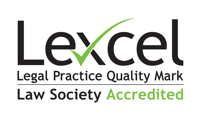
Architects Regulation Board (ARB) Lawyers
Put your trust in Clifford Johnston & Co.
- Specialist ARB Defence Solicitors
- Lexcel and Law Society Accreditations
- Experts at Protecting Your Architect Career
- Contact our Defence Solicitors for Architects
Architects Regulation Board (ARB) Solicitors
Defence Lawyers for Architects
Clifford Johnston & Co. solicitors has a team of professional discipline lawyers with the expertise and knowledge to assist you if you are being investigated by the Architects Regulation Board (ARB). We have a national client base and, although based in Stockport and Manchester, we can represent architects in professional discipline cases across the UK.
We understand that being investigated by the ARB is a very challenging and worrying time for you. You will no doubt be concerned about your livelihood, your character and your future career. The process is often long and drawn out. This can create the additional pressure of defending the allegations whilst maintaining your business. Our expert lawyers are available to assist and represent you throughout this difficult time.
Architects, by the very nature of their work, have a significant amount of responsibility and pressure to get things right. Because of this, any unacceptable professional conduct or serious professional incompetence is treated very seriously. The ARB deals with serious matters such as criminal convictions, dishonesty, lack of insurance and breaches of health and safety legislation. In addition, the ARB also deals with less serious complaints such as failure to respond promptly to complaints and failure to issue written terms of engagement.
If you are being investigated by the ARB, it is important that you contact a Defence Lawyer for Architects immediately. We will do everything possible to defend your career and your reputation. ARB hearings are held in public and members of the press and public are permitted to attend. There is, therefore, the risk of damage to your reputation and livelihood.
What is the Architects Regulation Board?
Most professionals are governed by a regulatory body. The ARB was set up in 1997 to regulate architects. It is an independent, public interest body aimed at ensuring good standards within the profession.
Some of its core functions, pursuant to the Architects Act 1997 (the ACT), include ensuring that architects meet their standards for conduct and practice and investigating complaints.
What sort of complaint can the ARB investigate?
The ARB can only investigate a complaint if you are on their register and if it concerns your conduct or competence in relation to the standards in the Architects Code of Conduct.
The ARB will investigate all allegations of unacceptable professional conduct or serious professional incompetence.
Section 14 of the Architects Act 1997 sets out two offences that may be committed by you, namely:
- unacceptable professional conduct and;
- serious professional incompetence.
The High Court has indicated that both offences must be ‘serious lapses’ in order for it to be appropriate that a disciplinary sanction be imposed.
What is unacceptable professional misconduct?
You will be deemed to have committed unacceptable professional conduct if your conduct falls short of the standard required of an architect in the circumstances.
The general test is whether you have fallen seriously short of the standard of conduct expected of a member of the profession. The conduct complained of must be serious.
What is serious professional incompetence?
This relates to the quality of the professional skills architects need to do their job.
The test is whether there has been a serious failure to meet the required standard of skill expected of a member of the profession undertaking a similar kind of job at the same time.
What is the Architects Code of Conduct?
This provides guidance for architects in their professional lives. It sets out the standards of professional conduct and practice expected of persons registered as architects.
The ARB will consider whether your actions amounted to unacceptable professional conduct or serious professional incompetence.
The ARB cannot deal with the following complaints:
- Order you to put right something which has gone wrong, or award compensation for poor service.
- Disputes about a contract or fee levels, or decide whether you may have been negligent. These are legal issues and must be dealt with through the courts.
- Investigate complaints that are more than six years old, unless there are special circumstances.
- Intervene in a planning dispute.
How does the ARB investigation process work?
There is a three-stage process namely (i) Review (ii) Investigations Panel; and (iii) Professional Conduct Committee.
The Review Stage
The Registrar can carry out what investigations they see fit. They will consider and review the complaint that has been made against you and decide whether it is one that they can deal with.
If it is, they will send it to you and invite you to reply. This is a very important stage in the process, therefore it is vital that you instruct a defence lawyer for architects to assist.
We will discuss the advantages and disadvantages of providing a response and discuss tactics. You should not respond to the ARB without first instructing a specialist ARB Lawyer. We can draft written representations on your behalf which may persuade the investigations panel to dismiss the complaint.
If you decide to respond, your comments/representations will be the sent to the person that complained.
The Registrar has the power to compel you to provide information and documentation as they see fit. You must promptly, fully and frankly comply with such a request.
Once the ARB has collated all the information, they will send the complaint and supporting documents to the investigating panel.
What happens at the Investigations Panel (IP) stage?
The panel is made up of 3 persons – one must be an architect and the other two will be members of the public.
The IP panel will consider the complaint against you in more detail and will make a decision as to whether you have a case to answer at the Professional Conduct Committee.
Although the IP will consider the evidence, they will not reach any conclusions on factual issues as these must be considered by the Professional Conduct Committee. They may, however, give less or no weight to evidence which is inherently weak, vague or inconsistent.
Before finalising their decision, you will be given the option to submit a further response.
The IP will notify all parties of their decision in writing.
The IP must consider whether the evidence provides a realistic prospect of a finding of unacceptable professional misconduct and/or serious professional misconduct. They must also decide whether it is in the public interest to proceed. Factors such as your health and insight will be taken into account.
After considering all the evidence, the IP can:
- dismiss the complaint against you;
- provide you with advice about your future conduct or practice;
- refer the complaint to the Professional Conduct Committee.
What happens at the Professional Conduct Committee (PCC) hearing?
You will be given at least 49 days’ notice of the hearing date, and be provided with a copy of the ARB’s Presenter’s Report.
You then have 21 days to give notice of whether you intend to attend the hearing and/or contest the charges. If you intend to plead not guilty, you must serve particulars of your defence, a copy of any witness statements or documents that you intend to rely on and the names and addresses of any witnesses that you intend to call to give evidence in support of your defence.
Your case will be heard before three committee members – one will be an architect, one a member of the public and it will be chaired by a legally qualified person.
The Presenter, on behalf of the ARB, will outline the case against you and call any witness and produce any document that thy wish to rely on,
After the Presenter has called their evidence, you can submit that you have no case to answer. This isn’t an easy legal submission to make; we, therefore, recommend that you instruct an expert ARB Lawyer to assist you. If successful, the charges against you will be dismissed.
If your application of no case to answer is not successful, you can call any witness, give evidence and/or produce any document.
Witnesses called by each party will most likely be cross examined by the other party.
After hearing the evidence, the Committee will decide whether you are guilty or not guilty of the charges. They will decide if you have behaved in a way that amounts to unacceptable professional conduct or serious professional incompetence (or both).
If you are found guilty, a penalty will be imposed upon you; a copy of the decision will be posted onto the ARB’s website and a press release issued.
What actions or penalties can the ARB take?
A finding of professional misconduct or incompetence against you is a serious matter.
The ARB will consider aggravating and mitigating features. Mitigation can include previous good performance, your personal circumstances, insight, remediation and length in time since the incident. Aggravating features can include previous findings of unacceptable conduct and lack of insight for example.
The ARB can impose the following sanctions under section 15 of the Architects Act 1997:
- issue a reprimand (a warning)
- fine you up to £5,000
- suspend you from the Register for up to two years – this means that you would not be able to use the term ‘architect’ for business purposes during this period.
- order that your name be erased from the Register – you wouldn’t be able to work under the title ‘architect’.
The Professional Conduct Committee must work from the bottom up and consider the least penalty first. They must ask themselves whether that penalty is sufficient and, if not, move onto the next sanction.
At this stage of the process, it is very important to mitigate the sanction. The PCC will take into account:
- Character references and testimonials;
- Your previous positive regulatory record;
- Remediation, insight and a genuine expression of remorse;
- Your engagement in the regulatory process;
- That your conduct has not seriously affected the complainant.
Can I appeal a decision of the Professional Conduct Committee?
Yes. PCC decisions can be appealed.
You can appeal a sanction to the High Court or the Court of Session in Scotland whereas the ARB and the witnesses involved in the case do not have any right of appeal.
You have three months after the hearing to lodge an appeal.
What will the ARB do if I have a criminal conviction?
You will be referred to the PCC if you have a caution or conviction that is relevant to your fitness to practise as an architect.
The purpose of a hearing is not to punish you a second time for the same offence, but to protect the public and maintain the reputation and integrity of the profession.
The Courts has determined that; “The reputation of the profession is more important than the fortunes of any individual member.”
How can we help?
Our specialist lawyers can assist you at any stage of the ARB investigation process.
We can:
- prepare and draft written representations at the review and investigations stage;
- gather evidence on your behalf;
- prepare you for PCC hearings;
- represent you at PCC hearings;
- advise how to lodge an appeal to the High Court;
- draft written submissions in respect of ‘consent orders’;
- represent you at the police station should you find yourself being investigated by the police;
- represent you at Court should be charged with any offence.
Why choose us?
Our regulatory law solicitors have 35 years’ experience defending members of the public. Although we have offices in Manchester and Stockport, we are regularly instructed by professionals across the UK.
We offer a bespoke service. We pride ourselves on our client care, response times, tactical and astute legal advice and our desire to achieve a successful outcome for our clients.
We have the knowledge to help you during this difficult time. We will work tirelessly to protect your reputation and your career.
If you find yourself being investigated by the ARB, please get in touch with our ARB Lawyers. It is important that you obtain legal advice as soon as a complaint has been received and before the ARB investigation panel considers your case. A careful and comprehensive response to the complaint may result in the early dismissal without any formal allegations being brought.
In our experience, professionals seek legal advice on the cusp of a hearing. This may limit the time that your lawyer has to properly prepare and defend your case. For example, it may be too late to put in place any corrective action and/or remediation.We recommend that you familiarise yourself with, and comply with, the Architects Code of Conduct. You must ensure that appropriate PI insurance is in place, that you have a written complaints procedure and that you issue written terms of engagement to your client at the outset. We also recommend that you notify your insurers too as any sanction may impact on linked civil proceedings.
Clifford Johnston & Co: Architects Regulation Board Lawyers

Need some professional advice?
Do you have any issues that you are worried about? Contact our professional team for a free, no-obligation informal discussion, where we can discuss your particular requirements in greater detail.














